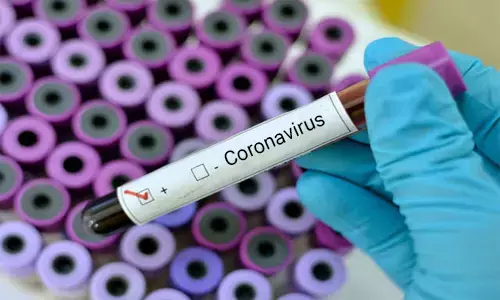- Home
- Medical news & Guidelines
- Anesthesiology
- Cardiology and CTVS
- Critical Care
- Dentistry
- Dermatology
- Diabetes and Endocrinology
- ENT
- Gastroenterology
- Medicine
- Nephrology
- Neurology
- Obstretics-Gynaecology
- Oncology
- Ophthalmology
- Orthopaedics
- Pediatrics-Neonatology
- Psychiatry
- Pulmonology
- Radiology
- Surgery
- Urology
- Laboratory Medicine
- Diet
- Nursing
- Paramedical
- Physiotherapy
- Health news
- Fact Check
- Bone Health Fact Check
- Brain Health Fact Check
- Cancer Related Fact Check
- Child Care Fact Check
- Dental and oral health fact check
- Diabetes and metabolic health fact check
- Diet and Nutrition Fact Check
- Eye and ENT Care Fact Check
- Fitness fact check
- Gut health fact check
- Heart health fact check
- Kidney health fact check
- Medical education fact check
- Men's health fact check
- Respiratory fact check
- Skin and hair care fact check
- Vaccine and Immunization fact check
- Women's health fact check
- AYUSH
- State News
- Andaman and Nicobar Islands
- Andhra Pradesh
- Arunachal Pradesh
- Assam
- Bihar
- Chandigarh
- Chattisgarh
- Dadra and Nagar Haveli
- Daman and Diu
- Delhi
- Goa
- Gujarat
- Haryana
- Himachal Pradesh
- Jammu & Kashmir
- Jharkhand
- Karnataka
- Kerala
- Ladakh
- Lakshadweep
- Madhya Pradesh
- Maharashtra
- Manipur
- Meghalaya
- Mizoram
- Nagaland
- Odisha
- Puducherry
- Punjab
- Rajasthan
- Sikkim
- Tamil Nadu
- Telangana
- Tripura
- Uttar Pradesh
- Uttrakhand
- West Bengal
- Medical Education
- Industry
Two new rapid tests that could help contain Coronavirus epidemic

WASHINGTON –World Health Organization officially declared the coronavirus outbreak in Wuhan, China,a public health emergency, and as of today, the virus has infected nearly 10,000 people in China, with the death toll soaring to more than 200. In order to contain this pandemic, healthcare workers need to quickly and accurately identify new coronavirus cases so that patients get crucial medical care and transmission can be halted. However, the Chinese labs that can test for coronavirus are currently overwhelmed. Therefore there is an urgent need to develop quick and easy tests to diagnose coronavirus infection.
Researchers have developed two new tests accurately diagnose coronavirus infection in about 1 hour. These tests could play a critical role in halting this deadly outbreak by enabling healthcare workers to isolate and treat patients much faster than is currently possible. The research has been published in AACC's Journal of Clinical Chemistry.
A team of researchers led by Leo L.M. Poon, DPhil, of the University of Hong Kong has developed two rapid tests for the coronavirus that could break this diagnostic bottleneck. Using a technology known as real-time reverse transcription-polymerase chain reaction (RT-PCR), the tests detect two gene regions that are only found in the Wuhan coronavirus (officially known as 2019-novel-coronavirus) and in other closely related coronaviruses such as SARS. The two gene regions detected by the tests are known as ORF1b and N. Significantly, both tests also take only about 1 hour and 15 minutes to run. This fast turnaround time could enable Chinese labs to greatly increase patient access to coronavirus testing.
To evaluate the performance of these tests, Poon's team first confirmed that the tests accurately identify genetic material extracted from cells infected with the SARS coronavirus. The researchers also showed that the tests return negative results for samples containing genetic material from other respiratory viruses, demonstrating that the tests accurately differentiate coronavirus infection from other causes of pneumonia. Lastly, Poon's team used the tests to analyze sputum and throat swab samples from two patients infected with the 2019-novel-coronavirus. The tests correctly gave positive results for both patients.
"Signs of [coronavirus] infection are highly non-specific and these include respiratory symptoms, fever, cough, [shortness of breath], and viral pneumonia," said Poon. "Thus, diagnostic tests specific for this infection are urgently needed for confirming suspected cases, screening patients, and conducting virus surveillance. The established assays [in this study] can achieve rapid detection of 2019-novel-coronavirus in human samples, thereby allowing early identification of patients."
For more details click on the link: https://doi.org/10.1093/clinchem/hvaa029
Hina Zahid Joined Medical Dialogue in 2017 with a passion to work as a Reporter. She coordinates with various national and international journals and association and covers all the stories related to Medical guidelines, Medical Journals, rare medical surgeries as well as all the updates in the medical field. Email: editorial@medicaldialogues.in. Contact no. 011-43720751
Dr Kamal Kant Kohli-MBBS, DTCD- a chest specialist with more than 30 years of practice and a flair for writing clinical articles, Dr Kamal Kant Kohli joined Medical Dialogues as a Chief Editor of Medical News. Besides writing articles, as an editor, he proofreads and verifies all the medical content published on Medical Dialogues including those coming from journals, studies,medical conferences,guidelines etc. Email: drkohli@medicaldialogues.in. Contact no. 011-43720751


